- Home
- Michael Crichton
Drug of Choice Page 3
Drug of Choice Read online
Page 3
Clark said, “I don’t understand.”
“What I mean is, Sharon’s a big star, and when a big star gets sick, there has to be an explanation for the press. Weirdo drugs don’t work. The people in Des Moines don’t buy it: how about phenobarb? Something simple?”
“It doesn’t look like barbiturate intoxication.”
“But you can’t be positive, right?”
“No, we can’t be positive, but—”
“Okay, Doc. Look: this is Thursday afternoon. We want to have something for the Friday papers, right? Let me work on it.”
Clark said nothing. Lafora grabbed his hand and shook it.
“I knew I could count on you, doc.”
He gave Clark a slap on the back and was gone.
An hour later, when Clark went out to tell the press there was no change in Sharon’s condition, he arrived to hear Tony Lafora telling them about the star’s depression over a secret and very unhappy love, and how the star had probably taken phenobarb.
At six in the morning, a nurse called him to say that Sharon Wilder was awake.
He found her sitting up in the bed, clutching the sheet to her neck, looking very vulnerable, confused and pretty.
“They tell me you saved my life,” she said. Her voice was husky.
“Not really,” he said.
“I want you to know I appreciate it.”
“Any time,” he said. He was struck by her beauty. She stared at him.
“You’re kind of cute,” she said.
He grinned. “So are you.”
“Yeah, but I’m paid for it. Can I get dressed?”
“I think so. How do you feel?”
“Just great.” She gave him a dazzling smile.
He found her clothes for her and waited outside while she dressed. When he returned, she was slipping into a pair of heels. He went over to the bed to look for the blue spot.
It was gone.
“Tell me, Miss Wilder—”
“Call me Sharon.”
“All right, Sharon. What do you remember about yesterday evening?”
“Well, I got dressed early, because it was a new dress and I was afraid it wouldn’t fit. So I took a shower, and dressed early, and did my face, and then sat down on the bed to relax before George arrived.”
“George?”
“George Washington. He’s this adorable biophysicist I know, really a dear. I don’t know him very well, I just met him in fact.”
“I see.”
“And I was waiting for him to arrive.”
“And?”
“And that’s all I remember.”
“Nothing else?”
She shook her head.
“Did you take anything?”
“A shower.”
“I meant, any drugs?”
“No. Why?”
“We can’t understand why you went into a coma.”
She laughed. “Neither can I, but it doesn’t matter, does it?” She kissed him on the cheek. “You’re sweet to care. By the way, is there a phone around here?”
“In the hall.”
“Good.”
She went outside. Clark watched her go, unable to help noticing her body. He heard her drop a dime into the phone, and he thought about what she had said. He reached into his pocket and withdrew the list of physicians and their phone numbers that Harry had given him. It was rather odd that she claimed she didn’t know George Washington well, he thought.
Because he had noticed a telephone bill in her purse. It was a bill three months old, and there were numerous long-distance charges to a number in Santa Monica.
The number was the office phone of George K. Washington.
Odd.
He found himself listening to her conversation on the phone.
“Harvey? Listen, it was beautiful! Just beautiful! Scrambled my brains. Wow! Yes…. I’ll talk to you later. No, no problems at all. I think it’s working. Fine. Right Bye….”
She hung up.
Clark went out to sign her discharge papers. It was a brief formality, and afterward she shook hands with him and said, “Why don’t you walk me out to my taxi?”
“All right.”
On the way, she said, “You really are cute. I was watching you sign the forms. When are you coming over for a drink?”
“I’m pretty busy, Miss Wilder.”
“I told you, call me Sharon.” She smiled. “And even busy doctors get some time off.”
Outside the hospital, he was surprised to find a half-dozen photographers. Sharon forced him to pose with her, and they took several more pictures as he helped her into the cab.
She looked out the window and said, “Remember that drink. My bar is always open and waiting.”
Then she reached up and kissed him.
The flashbulbs popped.
3. TAILSPIN II
HE WAS TIRED WHEN he got home. The apartment, as usual, was a mess; he never seemed able to get it completely clean, even when a girl was coming over.
He pushed a pair of dirty socks off the couch and sat down to read his mail. There were bills for the most part; a letter from a friend in the army, saying he hated it; a note from his travel agent reporting that Clark’s tickets to Mexico City were waiting, and that hotel reservations had been confirmed.
Clark was due for a month’s vacation, to start in a week. He had been looking forward to a trip to Mexico, a chance to get away from California and everyone he knew, a chance to be by himself.
Now, he suddenly found the prospect of a month alone in Mexico City less agreeable. It surprised him to find he was thinking differently, and it was several minutes before he realized what had changed.
Sharon Wilder.
As soon as he thought of it, he pushed her from his mind. It was foolish to even contemplate; film people were terrible, demanding, petty and childish; he shouldn’t even consider getting mixed up with…
He sighed.
He got up and made himself a drink, and then decided that he would call her, that it couldn’t possibly hurt anything if he just called.
Sharon’s number was not listed, so he called Gertrude Finch and got it from her.
A stiffly formal male voice answered: “Miss Wilder’s residence.”
“This is Dr. Clark calling. I wonder—”
“Oh yes, Dr. Clark. Miss Wilder left a message for you.” He had a queer sensation, part pleasure, part something else. “She did?”
“Yes, sir. I’ll get it for you.”
There was a pause, and then: “Dr. Clark? Pier Four, Marina Capitan. That’s in Long Beach. You’re to arrive after nine.”
Clark frowned.
“Shall I repeat that, sir?”
“No,” he said, still frowning.
“Very good, sir. Thank you for calling.”
The man at the other end hung up.
“What do you know about that?” Roger Clark said aloud. And he decided that he knew nothing about that, and went to shower and change.
Marina Capitan was an elegant, exclusive mooring filled with huge powerboats. At night the boats, all polished wood and gleaming chrome, rocked quietly in the dark. On pier Four, a large cruiser was lighted and noisy; Clark headed toward. it As he approached he could see people dancing on the stern and on the foredeck, and inside, people packed tight, drinking, talking, laughing.
He climbed the gangway, noting the name neatly stenciled on the bow: TAILSPIN II. As he came aboard he met a short, stocky man in bathing trunks and a knitted blue shirt.
“Who’re you?” the man said.
“Roger Clark.”
“I don’t know you,” the man said.
“I’m looking for Miss Wilder.”
“Oh yes,” the man said. He smiled. “You’re the sawbones.” He stuck out his hand. “Glad to have you aboard. Always glad to have a doctor: we may need you, after the broken glass. My name’s Pietro O’Hara.”
“How do you do. What broken glass?”
“Oh,�
�� O’Hara said, “there isn’t any yet but there will be. I know: I’ve given parties like this before.”
“It’s your boat?”
“Of course.” He grinned. “Business expense, naturally. Couldn’t manage it otherwise. Come on down and get yourself onto my accountant’s ledgers, and have a drink.” O’Hara squeezed through the crowd toward the bar, and Clark followed. The people were well-dressed, though rather garishly; the women were showing a lot of—
“Scotch?” O’Hara said.
“Please.”
—back, breasts, and legs. He noticed several quite stunning.
“She won’t be here for a while,” O’Hara said.
“Who?”
“Sharon. She always comes late, so to speak.” He gave a gurgling chuckle that seemed to well up from his intestines. “You interested in art?”
In the corner, a girl wore day-glo bodypaint and nothing else. “Yes.”
“Good. I’m an artist. I’ll show you some of my stuff. Do you like that particular piece?”
“What piece?” He looked away from the girl, back to O’Hara.
“Judy,” O’Hara said. “Did her this afternoon. A particularly effective composition, I believe. I like the colors and lines.”
“Yes,” Clark said.
“That particular work of art is for sale,” O’Hara said. “Two hundred dollars. A night. Come along, and I’ll show you some of my other things.”
They pushed through the crowd until they came to a corner of the cabin. There they paused before a square block of wood, into which was set a four-foot piece of round doweling, with a pointed tip. On the doweling was a sign which said, “HOSTILITY.”
O’Hara beamed proudly. “How do you like it?”
“Remarkable,” Clark said, taking a sip of Scotch.
“I’m very pleased with it. Came to me in a burst, a pure flash of inspiration. I was sleeping at the time, and jumped right up and built it.”
“Very interesting.”
“It’s entitled, ‘Hostility on Your Part.’ That’s because it’s supposed to represent a phallus. Did you get that? Some people don’t, right off.”
Clark smiled.
“I think it’s pretty funny, myself,” O’Hara said, and laughed.
Clark laughed.
“Love a man with a sense of humor,” O’Hara said. “Come on.”
In another part of the room was a small wooden statue of a beaver. It was quite carefully and accurately made.
“Like it?”
“Very good.”
“I call it ‘The Ultimate Beaver.’”
O’Hara slapped his thigh, roared, and spilled his drink. Clark dutifully laughed.
“You can see the kind of a mind I have,” O’Hara said, “but what the hell. I love my work. Come on.”
Shortly, they came to a painting of a hamburger, rendered accurate in every detail. Catsup was oozing out of the sides of the bun. O’Hara paused to look critically at the painting for several minutes.
“Now then,” he said, “this is a major work. Major.”
“I see.”
“Perhaps you can help me with it.”
“I’ll try.”
“I finished this a year ago, and I haven’t been able to decide on a title. No title, no money. Who’d buy a hamburger without a title?”
“Ummm.”
“My first thought was ‘Eat Me’, but that seemed a little obvious, don’t you think?”
“Yes. Obvious.”
“So then I thought of ‘Meat Between Your Buns’, but that seemed a little gross.”
“Gross,” Clark nodded.
“You realize, of course, that my subject, my life’s work, is filth. The future of pop art is filth and pornography. I’m trying to satirize pornography in my creations. See?”
“Yes.”
“So if the title isn’t good, it doesn’t go. Listen, I’ll tell you something. My first important piece, the one that brought me into the big time, was a thing I sold to some producer. It was an ordinary household fan, spray-painted shocking pink. You know what I called it?”
Clark shook his head, afraid to guess.
“‘Blowjob,’” O’Hara announced in triumph. “That’s what I called it, and it went for a thousand dollars. I had lots of offers for it. A great success. And now look at me.” He waved his hand around the yacht. “I have money, women, fame and fortune.”
“I can see that.”
O’Hara leaned close, and looked steadily at Clark. “Yeah, but I’ll tell you. Man to man: I’m not happy.”
“No?”
“It’s true. I was happier when I was working as a garage mechanic, and dreaming of making it big. Now… success seems empty to me.”
“I’m sorry to hear that,” Clark said.
“It’s the price of creativity,” O’Hara said, and wandered off.
“Brilliant, absolutely brilliant,” the man said. “If I say so myself. You know how it happened?”
“No,” Clark said. He had begun speaking to the man a few minutes before; he had introduced himself as Johnny Kane. He was very drunk.
“Well, it was a beautiful spring day, and I was sitting in my office, thinking about the account. We needed a fresh approach, but we were limited. I mean, there are things you just can’t say, and the public is sensitive. You can’t have somebody say, ‘My hemorrhoids were killing me, until I switched to X,’ and you can’t say, ‘Boy, did I ever have trouble with cramps and farting until I discovered Y.’ I’m talking about the tracts, now.”
“I see,” Clark said.
“So I was thinking, what do you say? What can you say? And then I realized that this was deep down distress, nothing shallow, but deep down distress, in the lower tract. For that deep down pain and discomfort in the lower tract, take the one medication that doctors recommend for their own—”
“Hello, darling,” a voice whispered in his ear. He turned: Sharon was wearing a crochet dress over a bodystocking, and a calm smile. She looked directly at him.
“I hear there’s a great view from the bridge,” she said.
“Is there?”
“You mustn’t miss it,” she said.
She took his arm and they moved through the crowd, then up a narrow stairs. She went first; he followed.
“Stop looking at my legs,” she said, as they went up.
“Be careful,” he said, “or I’ll bite your ankle.”
She stopped.
She lifted her foot back, to his face.
He looked at it for a moment, then bit the ankle. It was rather pleasant, actually, salty and nice.
She laughed. “Does that appeal to you?”
“No. It’s the way I get my kicks. Lost two front teeth once.”
“I’ll remember to be careful,” she said, and laughed again.
Up on the bridge, they could look down on the foredeck, and the couples dancing in the moonlight.
“I was afraid you wouldn’t telephone,” she said. “But I’m glad you decided to come.”
“Anytime,” he said.
“Well, later then,” she said.
“Ladies first,” he said.
She laughed. “My, you doctors are daring on your nights off.”
And he looked at her, and he thought to himself that it was funny, it was all pretty funny, and the drink was hitting him awfully hard, and Sharon said “I like considerate men,” and he moved forward to kiss her.
And fell. A long, long way.
4. THE LOVE NEXT
“RISE AND SHINE.”
He opened his eyes and smelled coffee. Sunlight streaming into a large room, across a vast bed. Sheets touching his skin. Sharon Wilder standing over him in a short robe, holding a tray.
“Good morning,” she said. “Did you sleep well?” He was confused, still thinking oddly and slowly. The boat…
“Very well.”
“Good,” she said. She set the tray on the bed and stretched. “So did I.”
He
looked across the bed at the other pillow, and then he looked back at her. She wore no makeup, her hair was loose and tangled, and she looked marvelous.
She handed him a coffee cup. “I hope you don’t mind,” she said, “about last night.”
“Not a bit,” he said, trying to remember.
“I know it must have been dull for you,” she said.
He had a vague memory, a slight stirring. “Absolutely not. It was wonderful.”
“I meant the party,” she said. “That dreadful party.”
“Oh yes.”
She giggled and kissed him on the neck. His coffee spilled; he jumped; she giggled again.
“I like you,” she said.
Then she went into a large closet, and began to dress. He glanced around the room. It was done in gold and white, with a huge bed covered with a canopy.
“Is this your bedroom?”
She giggled. “Yes. Don’t you remember?”
He looked out the window, at a broad lawn. “And your house?”
“Yes. I call it the Love Next. Do you like it?”
“Well, I haven’t seen very much of it.”
“Silly, I showed it all to you last night.”
“I meant the house.”
“So did I.”
She came out wearing a short skirt and blouse. “You’ll probably want to take a shower. It’s right in there.” She pointed to a door.
“Thanks.”
“Meantime I’ll make breakfast. Eggs and bacon?”
“You cook too?”
“Just mornings. I don’t like the servants around in the mornings.”
She walked out of the room and he got slowly up from the bed. He could remember nothing of the night before, nothing since being on the bridge of the boat.
It was odd, disorienting. He must have been drunk as hell. Yet there was no hangover; in fact, he felt marvelous. Better than he’d felt in a long time.
He walked around the room, looking at her makeup desk, her closet, a small writing table in the corner. There was a letter on top of the desk; he glanced at it curiously. It was from a travel agency, stating that her two tickets to San Cristobal Island were enclosed. The payment had been made by Advance, Inc. and all was in order. She would fly by jet from Los Angeles to Miami, and change planes for Nassau. From there she would travel by the special hotel airplane to San Cristobal.
Clark frowned. He had never heard of San Cristobal. And he wondered about the hotel; the letter did not specify it by name.

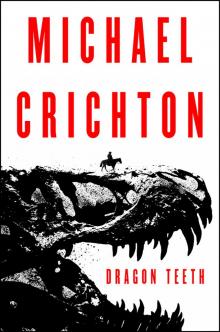 Dragon Teeth
Dragon Teeth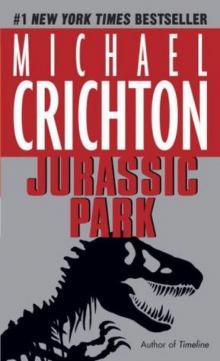 Jurassic Park
Jurassic Park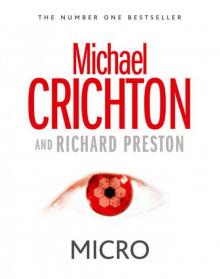 Micro
Micro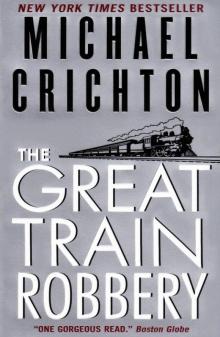 The Great Train Robbery
The Great Train Robbery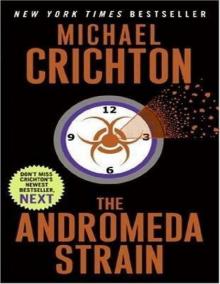 The Andromeda Strain
The Andromeda Strain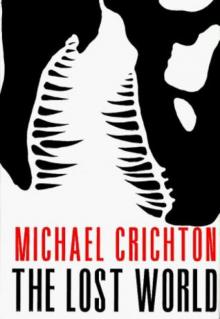 The Lost World
The Lost World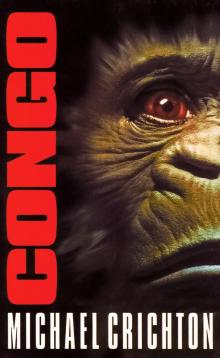 Congo
Congo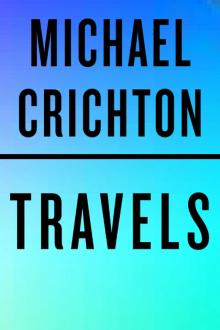 Travels
Travels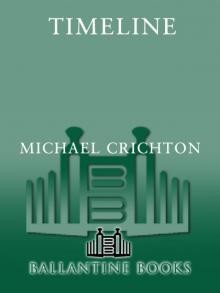 Timeline
Timeline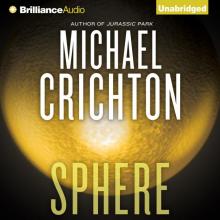 Sphere
Sphere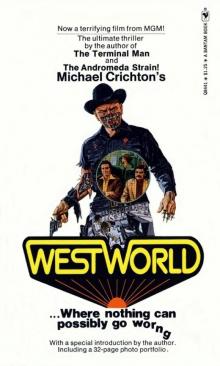 Westworld
Westworld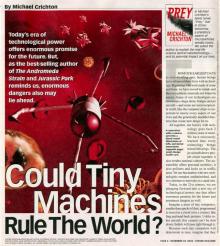 Prey
Prey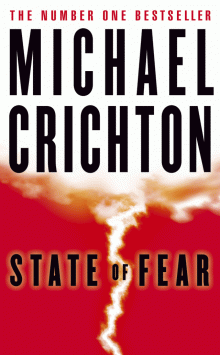 State Of Fear
State Of Fear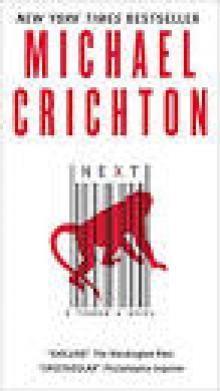 Next
Next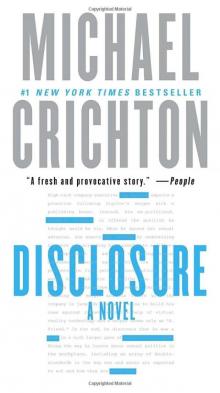 Disclosure
Disclosure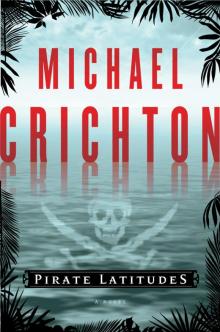 Pirate Latitudes
Pirate Latitudes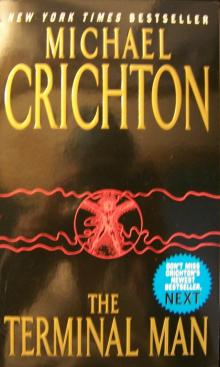 The Terminal Man
The Terminal Man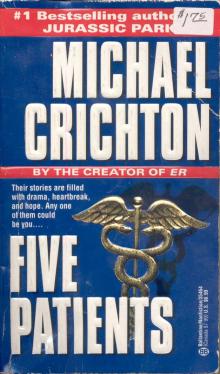 Five Patients
Five Patients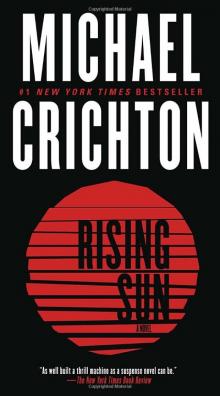 Rising Sun
Rising Sun Binary
Binary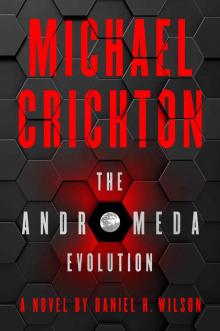 The Andromeda Evolution
The Andromeda Evolution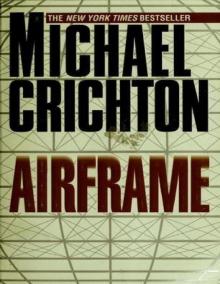 Airframe
Airframe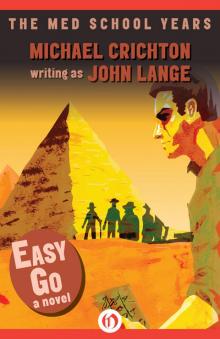 Easy Go
Easy Go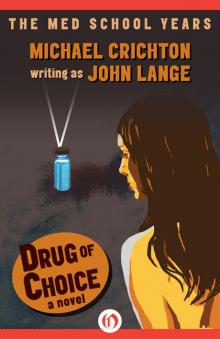 Drug of Choice
Drug of Choice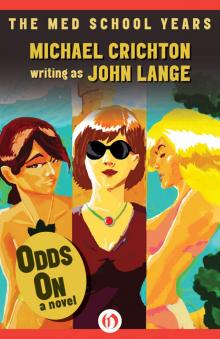 Odds On: A Novel
Odds On: A Novel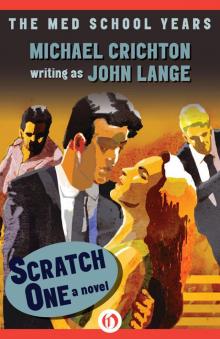 Scratch One
Scratch One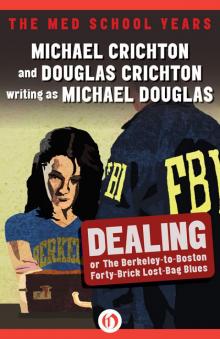 Dealing or The Berkeley-to-Boston Forty-Brick Lost-Bag Blues
Dealing or The Berkeley-to-Boston Forty-Brick Lost-Bag Blues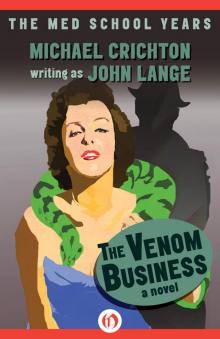 Venom Business
Venom Business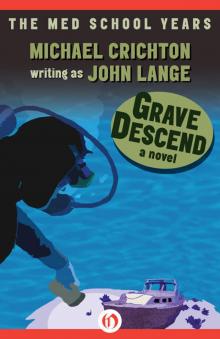 Grave Descend
Grave Descend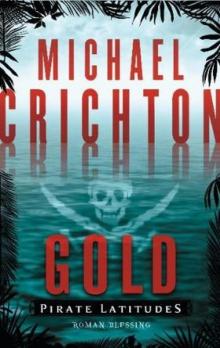 Gold - Pirate Latitudes
Gold - Pirate Latitudes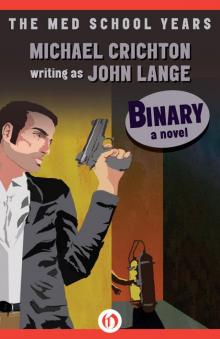 Binary: A Novel
Binary: A Novel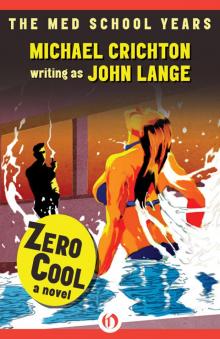 Zero Cool
Zero Cool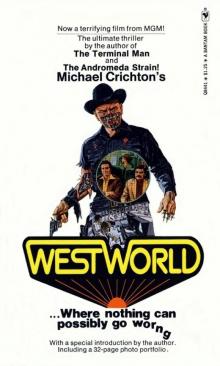 Delos 1 - Westworld
Delos 1 - Westworld